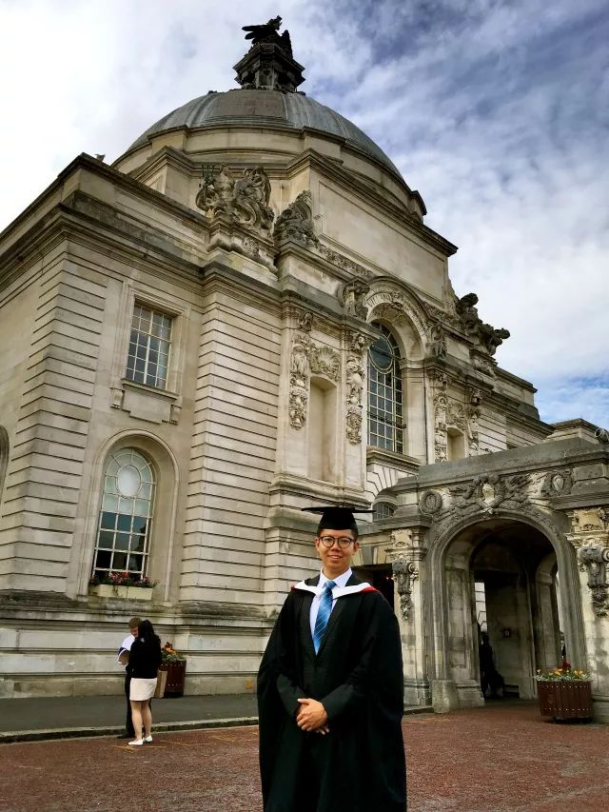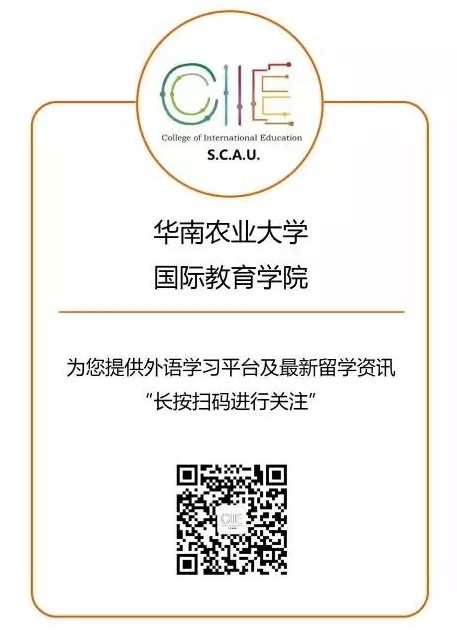Every student has a moment of longing to study abroad, experience a different kind of life, see different universities, experience different class, participate in different clubs, try different forms of entertainment, and think that the world is so big, my memories of youth should not be so singular...
The journey of studying abroad is about to begin.
Let's take a look at our alumnus sharing his experience of studying abroad~
Ma Zixin
September 2012-June 2014 Electronic Engineering 2+2 program at SCAU
September2014-June 2016 Bachelor in Electronic and Electrical Engineering at Cardiff University with first class degree (top 10% in the program)
September 2016-June 2017 Master in Financial Engineering at University College London (scholarship + native British English)
Working experience
Internship in Market Analysis for a London E-commerce Company
Received interview from Citibank and Big Four Accounting Firms
Received offer from Price waterhouse Coopers in Shenzhen

Q&A
My share
Why studying abroad?
I had plans to study abroad since high school, but later I learned that SCAU was running an sino-foreign cooperative education program. After discussing with my parents, I decided to apply for it. At first, my parents disagreed and hoped that I would complete my undergraduate degree in China before going abroad. Later, my mother was convinced by her colleagues that going abroad early can help to better adapt to the environment, and can also obtain certificate from both SCAU and overseas universities. Why not? So I bravely became the first person to eat crabs and became a student in the first batch of 2+2 sino-foreign cooperative education program at SCAU.
Is it worth studying abroad?
It is worth studying abroad. Studying abroad for further education has broadened one's horizons and perspectives, enabling them to appreciate the advantages of Western education and solidly improve their professional knowledge and skills. During my study in the UK, I also made friends with people from all over the world and locals in the UK, expanding my circle and social network. The most important thing is that I have greatly improved my English proficiency, which is a lifelong treasure. Whether entering foreign enterprises in the future, engaging in international business and commercial cooperation, or traveling to other countries, it is a valuable ability. Through these years of studying in the UK, I have successfully completed my professional transformation, received offers from the Big Four, and entered my favorite financial field.
How to choose countries?
The country I chose was the UK, and due to policy changes a few years ago, we only had four months of student visas after graduation to find jobs. Time was tight, so many companies were not willing to give international students the opportunity for interview. But if prepared in advance and actively applied, there was still a chance to stay and work and have an overseas employment experience. In addition, the quality of education in the UK is on par with that of the United States, and is at a global leading level. Therefore, studying abroad in the UK is a significant improvement in one's academic background and perspective.
Difficulties during overseas study
The main difficulty was still the language barrier. I initially had poor IELTS scores when preparing to go abroad, but still struggled to reach 6.5 in the third round of IELTS test. In the end, I enrolled in language course at Cardiff University. But most language classes were students from non English speaking countries, making it difficult to practice English. At the beginning of the regular class, as I was transferred to year 2 and had not fully studied the knowledge of year 1, I couldn't understand at first, and there was also a lack of professional knowledge, and I could not fully keep up with the pace of the class, resulting in a lot of effort in both homework and project. Fortunately, one of the members of the group project, a Hong Kong compatriot, patiently explained to me and provided me with some guidance. At the same time, I also went back to my dormitory every day to check for deficiencies and gradually overcame the difficulties of language barrier
In order to break through the language barrier, I did not rent a house off campus like other classmates. Instead, I chose to live in international student dormitories, eat, live, and have fun with schoolmates from all over the world. Through conversations with international friends, I improved my spoken English and actively learned about local culture and native expressions, overcoming cultural shock. I also utilized my advantages in mathematics to learn English expressions for mathematical operations, tutored foreign students in their homework, which rapidly improved my oral proficiency. During my internship, the Australian boss even thought that I had been studying in the UK since middle school because my accent was quite pure, which made me very proud.

Classes at overseas universities
In overseas universities teachers do not attach great importance to roll call and signing in, so students who attend classes are those who are willing to learn, which is different from many people in China who sit and play with their phones in the classroom. The classes at overseas universities are relatively flexible, with a lot of interaction. If you don't understand, you can raise your hand and ask questions at any time. I think this is great.
Future plans
My undergraduate major is not in line with my graduate major which is financial engineering. My initial plan is to start with finance, in order to further switch to foreign banks, securities, venture capital, and private equity industries. I think that I will study abroad for an MBA program in three years and strive for overseas job opportunities. Finally, I will return to my home country to work. (here is my tip: It is best not to choose marketing as the first degree for finance majors, as future development direction may be limited). The reason for choosing the Big Four is that the starting salary may not be very high, but with a good platform, there is a lot of room for future salary increases, and there are many job hopping directions in the future.
Big companies like the Big Four don't really care about whether your majors match. They mainly value your personal abilities, but you still need to have a basic understanding of the industry. The Big Four provide comprehensive training for new employers in any major, so there's no need to worry. (here is my tip: we do not use our native language abroad, so the job requirements are not that high. After returning to China, we mainly use our native language for interviews, so job requirements become higher).
For current students
Mainly in three aspects
One is learning,
I had received scholarships in Cardiff University for two years, totaling around 60000 to 70000 RMB. GPA at SCAU in the first two years is also evaluated, so even in China, you still need to study hard and improve your GPA. Of course, it is even more important to study hard abroad, as the intensity of studying abroad is very high, especially during master year. If there is any laziness or unreasonable arrangement, you are very likely to fail the course or fail to graduate on time.
And in China, you should make every effort to improve you English proficiency, which is conducive to alleviating the cultural shock when you first went abroad and quickly adapting to life and learning abroad.
The second is life,
I applied for dormitories on campus at Cardiff University to live with local British students and international students from various countries, which greatly improved my oral expression and fluency.
So, when study abroad, don't hide in the circle of Chinese friends, try to communicate with international students or local British students as much as possible. You should know that British people are relatively aloof. If you close yourself up and don't communicate with others, they won't pay attention to you. Conversely, if you open up and chat with them, they will also welcome you very much.
The third is work,
When looking for a job, it's important to start as early as possible, including preparing CV and cover letters. Once completed, you can ask the school's career center to help you revise them.
In the first two months of looking for a job, there may be many failures, which is not scary. It is important to be good at summarizing and accumulating more experience for future interviews.
You shall bear in mind that whether you plan to work abroad or not, it's never wrong to participate in more interviews abroad. It can help you accumulate more experience and expand your social network through networking, both domestically and internationally. Perhaps you will meet an HR or company executive, gain their favor and have the opportunity for interview by skipping the initial resume screening process.
To learn more about alumni’s stories of studying abroad and send wishes for the sino-foreign cooperative education program at SCAU, please copy the following link to watch in the browser: https://pan.baidu.com/s/1He8JN9Q7kcbPSVN-vISIdg



